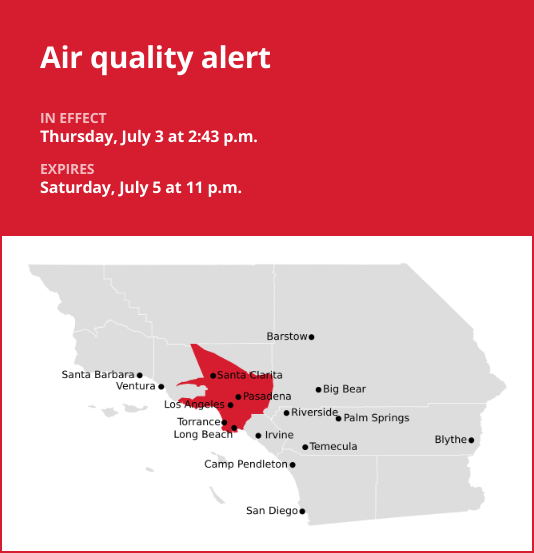Los Angeles County is included in an air quality alert reported by the National Weather Service on Thursday at 2:43 p.m. The alert is in effect until Saturday July 5, at 11 p.m.
The NWS Los Angeles/Oxnard CA adds to expect, “The South Coast AQMD has issued an air quality alert due to harmful levels of fine particle pollution.”
“Particle pollution can get deep into the lungs and cause serious health problems such as heart attacks, bronchitis, asthma attacks, and difficulty breathing. Everyone can be affected, but sensitive groups such as people with lung or heart disease, older adults, people who are pregnant, children, and those who spend a lot of time outdoors are at greater risk,” according to the NWS.
The full list of affected locations includes:
- Calabasas/Agoura Hills
- San Fernando Valley
- Eastern San Gabriel Mountains
- Eastern Santa Monica Mountains Recreational area
- 5 Freeway corridor near Santa Clarita
- Los Angeles County Beaches
- Los Angeles County Inland Coast including Downtown Los Angeles
- San Gabriel Valley
- Malibu
- Palos Verdes Peninsula
- Santa Clarita Valley
- Santa Susana Mountains
- Western San Gabriel Mountains/Highway 14 Corridor
- Western Santa Monica Mountains Recreational area

Air quality alerts: Recommendations from the NWS
When an air quality alert pops up on the radar, deciphering its implications is crucial. These alerts, issued by the NWS, come with straightforward yet essential guidance to ensure your safety:
Prioritize indoor stay:
If it’s within your means, stay indoors, especially if you have respiratory issues, health concerns, or fall within the senior or child demographics.
Minimize outdoor exposure:
When venturing outside is unavoidable, restrict your time outdoors solely to essential activities. Reducing exposure is paramount.
Mitigate pollution sources:
Be conscious of activities that contribute to pollution, such as driving cars, using gas-powered lawnmowers, or relying on motorized vehicles. Curtail their use during air quality alerts.
A ban on open burning:
Avoid burning debris or any other materials during air quality alerts. This contributes to worsened air quality.
Stay informed:
Keep yourself well-informed by tuning in to NOAA Weather Radio or your preferred weather news outlet. Staying in the loop empowers you to make informed decisions regarding outdoor engagements during air quality alerts.
Respiratory health matters:
If you have respiratory problems or underlying health conditions, exercise extra caution. These conditions can increase your vulnerability to adverse effects from poor air quality.
Following the recommendations from the NWS helps bolster your safety during air quality alerts, minimizing your exposure to potentially harmful pollutants. Stay vigilant, stay protected, and make your health the top priority.